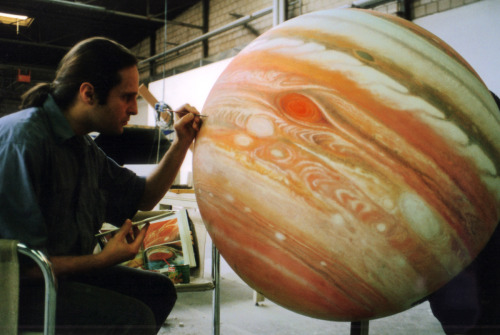Intergalacticnerd - Space N Shit

More Posts from Intergalacticnerd and Others

Colors of Earth
When we think of our globe from a distance, we generally visualize two colors: blue and green. Water and land. Mostly water, consequently, our planet’s nickname of the blue marble.
Traveling around the globe every 90 minutes covering millions of miles with a focused lens on our beautiful planet from 250 miles above, I’ve captured many beautiful colors beyond blue and green that showcase Earth in new and interesting ways. Some colors are indicative of nature like desert sands and weather like snow. Other colors tell stories of Earth’s climate in bright splashes of yellows and greens of pollen and muted grey tones and clouded filters of pollution.
Blue and green still remain vivid and beautiful colors on Earth from the vantage point of the International Space Station, but here are some other colors that have caught my eye from my orbital perspective.

African violet

Bahamas blues

Tropical in Africa

Yellow desert

Orange in Egypt

Red surprise

Snow white
Follow my Year In Space on Twitter, Facebook and Instagram!

This new NASA/ESA Hubble Space Telescope image shows three of Jupiter’s largest moons parade (seems the perfect word for it) across the giant gas planet. This happens only once or twice every 10 years.
Here’s a more clear view to it:


Psychedelic Pluto : New Horizons scientists made this false color image of Pluto using a technique called principal component analysis to highlight the many subtle color differences between Plutos distinct regions.
js

NGC 660. A rare galaxy type, polar ring galaxies have a substantial population of stars, gas, and dust orbiting in rings nearly perpendicular to the plane of a flat galactic disk. Only about a dozen of such galaxies have been discovered
Source: https://imgur.com/z73B8o3
What’s Up for January?

A meteor shower, a binocular comet and the winter circle of stars. Here are the details:
Quadrantid Meteor Shower

The Quadrantid meteor shower on Jan. 4 will either sizzle or fizzle for observers in the U.S. The shower may favor the U.S. or it could favor Europe depending on which prediction turns out to be correct. For viewing in the United States, observers should start at 3 a.m. EST. The peak should last about two hours with rates of 120 meteors per hour predicted in areas with a dark sky.
Comet Catalina

In the middle of the month, midnight to predawn will be primetime for viewing Comet Catalina. It should be visible with binoculars if you have a dark sky, but a telescope would be ideal. Between the 14th and 17th the comet will pass by two stunning galaxies: M51, the whirlpool galaxy and M101, a fainter spiral galaxy.
Constellation Orion

Winter is also the best time to view the constellation Orion in the southeastern sky. Even in the city, you’ll see that it’s stars have different colors. Not telescope needed, just look up a few hours after sunset! The colorful stars of Orion are part of the winter circle of stars.
Make sure to follow us on Tumblr for your regular dose of space: http://nasa.tumblr.com

M45, The Pleiades Star Cluster


Scientists are getting closer to finding the ninth planet
California Institute of Technology scientists shocked the world when they announced the possible existence of a ninth planet in our solar system earlier this year. The only problem is the finding is based on a mathematical model, not on direct observation. The planet orbits so far out on the fringes of our solar system that it likely takes up to 20,000 years to make it around the sun. Spotting it will be like looking for a needle in a haystack. But that haystack just got a bit smaller.
Follow @the-future-now
Solar System: 2015 Year in Review

Two mysterious worlds explored for the first time. Liquid water seen flowing on Mars. A global ocean discovered hiding inside a moon of Saturn. Even during our Era of audacious solar system exploration, 2015 stands out. Here are a few highlights:
1. New Horizons Reveals the Face of Pluto

Whether or not you call it a planet, Pluto entranced the people of Earth when it sent a love note from three billion miles away via our New Horizons spacecraft.
2. Dawn Comes to Ceres

The dwarf planet Ceres, the largest object in the main asteroid belt, teased explorers with its bizarre bright spots before finally giving up some of its secrets to the Dawn spacecraft. HERE are the latest findings.
3. Cassini Marks Discoveries and Milestones at Enceladus

When the Cassini spacecraft performs its final close flyby of Saturn’s icy moon Enceladus on Dec. 19, it will be a true milestone. Scientists using data from Cassini’s instruments have uncovered astounding secrets about this small moon, including (confirmed this year) the fact that its underground ocean of liquid water is global, and is home to hydrothermal vents.
4. We Confirmed Evidence that Liquid Water Flows on Today’s Mars

Findings from our Mars Reconnaissance Orbiter (MRO) provided the strongest evidence yet that liquid water flows intermittently — on present-day Mars.
5. Rosetta Passes Perihelion

The European Space Agency’s Rosetta mission had a remarkable year, re-establishing contact with the Philae lander and following comet 67P/Churyumov-Gerasimenko as it swung near the sun.
6. Mars Explorers Confirm Lakes Once Dotted Mars

A study from the team behind our Mars Science Laboratory/Curiosity Rover confirmed that Mars was once, billions of years ago, capable of storing water in lakes over an extended period of time.
7. MAVEN Finds a Culprit in the Loss of Mars’ Atmosphere

The Mars Atmosphere and Volatile Evolution (MAVEN) mission identified the process that appears to have played a key role in the transition of the Martian climate from an early, warm and wet environment that might have supported surface life to the cold, arid planet that Mars is today.
8. Akatsuki Gets a Second Chance at Venus

Five years after a mishap sent the spacecraft off course, the Japan Aerospace Exploration Agency (JAXA) successfully inserted the Venus Climate Orbiter “Akatsuki” into orbit around Venus. While the mission is not funded by NASA, an agency partnership with JAXA provides an opportunity for eight of our scientists to work with the Akatsuki team and study data from the spacecraft over the next year or so.
9. A Trailblazing Mission Sends Its Final Message from Mercury

After a flight of nearly 11 years, the highly successful MESSENGER mission ended when, as planned, the spacecraft slammed into the surface of Mercury.
10. Mars Reconnaissance Orbiter Completes 40,000 Orbits

Mars Reconnaissance Orbiter, at Mars since 2006, has orbited the Red Planet more than 40,000 times. The mission, which studies the whole planet from space, has shown that Mars is diverse and dynamic by way of many thousands of spectacular images and other kinds of data.
Make sure to follow us on Tumblr for your regular dose of space: http://nasa.tumblr.com
-
 3rdl3gend liked this · 3 weeks ago
3rdl3gend liked this · 3 weeks ago -
 princess-bubblegvm reblogged this · 3 weeks ago
princess-bubblegvm reblogged this · 3 weeks ago -
 omgherbalicious liked this · 1 month ago
omgherbalicious liked this · 1 month ago -
 mackenxxxxx reblogged this · 1 month ago
mackenxxxxx reblogged this · 1 month ago -
 lefraksfinest liked this · 1 month ago
lefraksfinest liked this · 1 month ago -
 glam0ur reblogged this · 1 month ago
glam0ur reblogged this · 1 month ago -
 shanabeee reblogged this · 1 month ago
shanabeee reblogged this · 1 month ago -
 chryso-poeia liked this · 1 month ago
chryso-poeia liked this · 1 month ago -
 briithebelle liked this · 2 months ago
briithebelle liked this · 2 months ago -
 thebluecallsme liked this · 2 months ago
thebluecallsme liked this · 2 months ago -
 daugtherofgaia777 reblogged this · 2 months ago
daugtherofgaia777 reblogged this · 2 months ago -
 bipolarchoirboy reblogged this · 2 months ago
bipolarchoirboy reblogged this · 2 months ago -
 plushpuppyy liked this · 2 months ago
plushpuppyy liked this · 2 months ago -
 jasondtx reblogged this · 2 months ago
jasondtx reblogged this · 2 months ago -
 jasondtx liked this · 2 months ago
jasondtx liked this · 2 months ago -
 dajahashea reblogged this · 2 months ago
dajahashea reblogged this · 2 months ago -
 liberationdiary liked this · 2 months ago
liberationdiary liked this · 2 months ago -
 souslevent liked this · 2 months ago
souslevent liked this · 2 months ago -
 sol1s liked this · 2 months ago
sol1s liked this · 2 months ago -
 sophmrie liked this · 2 months ago
sophmrie liked this · 2 months ago -
 stanseason liked this · 2 months ago
stanseason liked this · 2 months ago -
 biteonmypeach liked this · 2 months ago
biteonmypeach liked this · 2 months ago -
 nturav3rage reblogged this · 2 months ago
nturav3rage reblogged this · 2 months ago -
 999grace reblogged this · 2 months ago
999grace reblogged this · 2 months ago -
 dwntwnn00 reblogged this · 2 months ago
dwntwnn00 reblogged this · 2 months ago -
 dwntwnn00 liked this · 2 months ago
dwntwnn00 liked this · 2 months ago -
 voodoo-777 liked this · 2 months ago
voodoo-777 liked this · 2 months ago -
 voodoo-777 reblogged this · 2 months ago
voodoo-777 reblogged this · 2 months ago -
 questionmark2000 liked this · 2 months ago
questionmark2000 liked this · 2 months ago -
 eddiegriffin16 liked this · 2 months ago
eddiegriffin16 liked this · 2 months ago -
 itsjadasisntit liked this · 2 months ago
itsjadasisntit liked this · 2 months ago -
 darkadia-klownin reblogged this · 2 months ago
darkadia-klownin reblogged this · 2 months ago -
 jadesejasper reblogged this · 2 months ago
jadesejasper reblogged this · 2 months ago -
 brandyserephina liked this · 2 months ago
brandyserephina liked this · 2 months ago -
 sxmxw reblogged this · 2 months ago
sxmxw reblogged this · 2 months ago -
 sxmxw liked this · 2 months ago
sxmxw liked this · 2 months ago -
 daprettiestaries reblogged this · 2 months ago
daprettiestaries reblogged this · 2 months ago -
 braccodior liked this · 2 months ago
braccodior liked this · 2 months ago -
 mov33 liked this · 2 months ago
mov33 liked this · 2 months ago -
 iamrgetdough777 reblogged this · 2 months ago
iamrgetdough777 reblogged this · 2 months ago -
 kayarieeee reblogged this · 2 months ago
kayarieeee reblogged this · 2 months ago -
 pedragelo reblogged this · 2 months ago
pedragelo reblogged this · 2 months ago -
 slumsaintt reblogged this · 2 months ago
slumsaintt reblogged this · 2 months ago -
 larsen-fox liked this · 3 months ago
larsen-fox liked this · 3 months ago -
 timedestroyseverythingnow liked this · 3 months ago
timedestroyseverythingnow liked this · 3 months ago
"Astronomy compels the soul to look upwards and leads us from this world to another." - Plato
147 posts




